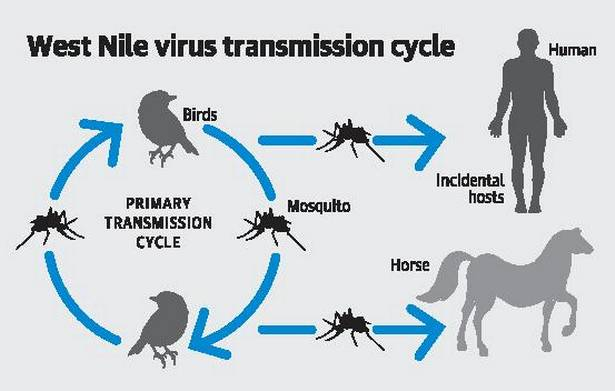On 30 August 2021, Russia warned of a possible surge in West Nile virus infections this Autumn as mild temperatures and heavy precipitation turn out to be favourable conditions for the mosquitoes that carry the virus.
According to Russia's consumer health watchdog, Rospotrebnadzor, "In light of favourable climatic conditions this year - an abundance of precipitation... a warm and long autumn, a high number of (virus) carriers could be observed in the autumn."
This comes after 80% of the West Nile fever cases in Russia are registered in the country’s southwest.
What is West Nile Virus?
West Nile Virus is an infectious disease that spreads from birds to humans with the bite of an infected Culex mosquito and may lead to fatal neurological diseases in humans. However, most infected people never develop any symptoms.

Image Credit: The Hindu
The virus which originated in Africa has spread to Europe, Asia and North America over the years. According to US Centers for Disease Control and Prevention (CDC), West Nile Virus is the leading cause of mosquito-borne disease in the continental United States.
Symptoms of West Nile Virus
Most people infected with the virus (8 out of 10) do not exhibit any symptoms. About one in every five infected people develop a fever with other symptoms such as headache, body aches, joint pains, vomiting, diarrhoea, or rash.
About 1 in 150 infected people develop a serious illness affecting the central nervous system. It may cause encephalitis, inflammation of the brain or meningitis, inflammation of the membranes that surround the brain and spinal cord.
Severe illnesses include high fever, headache, neck stiffness, stupor, disorientation, coma, tremors, convulsions, muscle weakness, vision loss, numbness and paralysis.
Although the severe illness can occur in people of any age, people over 60 years of age and people with specific medical conditions such as cancer, diabetes, hypertension, kidney disease, and people who have undergone organ transplants, are at greater risk.
Recovery Period
People who develop fever due to the virus recover completely but the fatigue and weakness can last for weeks or in some cases for months. However, recovery from severe illness might take several weeks or months and some effects on the central nervous system might be permanent.
Precautions and Treatment
The risk of the virus can be reduced using insect repellent, long-sleeved shirts and pants to avoid mosquito bites. As of now, there are no medications or vaccines available for the said virus but over-the-counter pain relievers can be used to reduce fever and relieve some symptoms. In severe cases, patients are hospitalized to receive supportive treatment, such as intravenous fluids, pain medication, and nursing care.
How is the virus diagnosed?
The West Nile can be diagnosed through physical examination, laboratory tests and medical history.
What is the favourable season?
Most cases of West Nile Virus usually occur during the mosquito season that begins in the summer and continues through fall.
| Origin of the virus In 1937, the virus was first isolated in a woman in the West Nile district of Uganda and in 1953, it was detected in birds (Crows and Columbiformes) in the Nile delta region. Prior to 1997, the virus was not considered pathogenic for birds but at that point in time, a more virulent strain was responsible for the death of different bird species in Israel that exhibited signs of encephalitis and paralysis. Human infections attributable to West Nile Virus have been reported in many countries for more than 50 years. |
Comments
All Comments (0)
Join the conversation